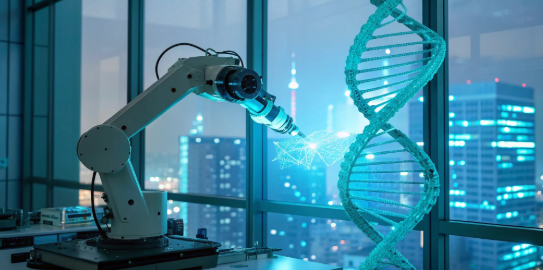The most sought-after AI professionals aren't just looking for a paycheck; they're looking for a mission. They want to solve complex problems that have a real-world impact, and they have their choice of where to work. To attract them, you need to think like they do. What kind of projects will challenge them? What opportunities for growth will keep them engaged? Building a team of top life sciences AI talent requires more than a competitive salary—it requires creating an environment where they can do their best work. This guide will show you how to build that environment and become a magnet for the best minds in the field.
Key Takeaways
- Look for a Blend of Science and Code: The best AI talent for life sciences combines deep technical expertise with genuine industry knowledge. They need to understand both the algorithms and the specific challenges of drug discovery or clinical trials to be truly effective.
- Focus on Transformation, Not Just Automation: Implementing AI is about more than just making old processes faster. It’s an opportunity to shift your team’s focus from routine data tasks to high-value strategic work, like interpreting results and driving new research.
- Compete for Talent with a Strong Culture: In a competitive market, a great salary is just the starting point. Attract and keep the best people by offering clear career growth paths, a flexible work environment, and a supportive culture where they can do meaningful work.
How Is AI Reshaping the Life Sciences?
Artificial intelligence is fundamentally changing how life sciences companies operate, from the lab bench to the manufacturing floor. It’s not just about doing things faster; it’s about discovering new possibilities that were out of reach before. For businesses, this means a massive opportunity for innovation and efficiency. For professionals in the field, it signals a demand for new, hybrid skill sets that blend deep scientific knowledge with technical expertise. AI and automation are creating a new landscape in life sciences, impacting everything from initial research to risk management. This shift is creating a need for specialized talent that can build and manage these intelligent systems, driving the industry forward.
Speeding Up Drug Discovery and Development
The traditional path to discovering new drugs is incredibly long and expensive. AI is changing that by dramatically accelerating the research and development process. Machine learning algorithms can analyze massive biological datasets in a fraction of the time it would take a human, identifying patterns and predicting how potential drug compounds might behave. This allows scientists to pinpoint the most promising candidates for further testing much earlier. This data-driven approach not only saves time and resources but also opens the door to discovering treatments for complex diseases. The demand for professionals with expertise in Data Science & Analytics is growing as companies rely on them to build the models that power this new era of discovery.
Improving Manufacturing and Quality Control
Once a drug is developed, ensuring it’s manufactured safely and consistently is critical. Life sciences companies are increasingly turning to AI to refine their production processes. According to a recent report, the top reasons for AI adoption are to improve product quality and make operations more efficient. AI-powered systems can monitor equipment in real-time to predict maintenance needs, use computer vision to spot defects invisible to the human eye, and optimize supply chains to prevent shortages. This leads to higher-quality products, less waste, and more resilient operations. The AI Engineers who design and implement these systems are essential for bringing this level of precision to manufacturing.
Going Beyond Simple Automation
The biggest impact of AI in life sciences isn't just about automating old processes—it's about completely rethinking how work gets done. Companies are undergoing a true digital transformation, using AI to drive major gains in efficiency and uncover new ideas. Instead of simply digitizing paperwork, they are using AI to design more effective clinical trials, develop personalized treatment plans based on a patient’s genetic makeup, and analyze real-world data to understand how medicines perform after they hit the market. This strategic shift requires a new way of thinking and a workforce that can connect AI capabilities with scientific goals. It’s about using technology to ask bigger questions and find answers that were previously unattainable.
What Skills Do AI Professionals in Life Sciences Need?
Finding the right person for an AI role in the life sciences isn't just about checking off technical qualifications. This specialized field demands a unique combination of skills that bridges the gap between complex algorithms and human biology. A great candidate is more than a coder; they're a problem-solver who understands the specific challenges and high stakes of the industry, from drug discovery to patient outcomes. They need to be able to see both the code and the cure.
To build a successful team, you need to look for professionals who bring a multifaceted skill set to the table. It’s this blend of technical prowess and deep industry insight that truly makes a difference and drives innovation. When you’re evaluating candidates or building your own skill set, it's helpful to focus on four key areas that define a top-tier professional in this space: core technical expertise, specific domain knowledge, data handling capabilities, and strategic communication. Excelling in these areas is what separates a good AI professional from a great one in the life sciences sector, and it's the key to building a team that can truly make an impact.
Core AI and Machine Learning Expertise
At the foundation of any AI role is a strong command of the technology itself. Professionals need a solid understanding of advanced machine learning models, neural networks, and natural language processing. But it’s not just about knowing the theory. The real value comes from being able to apply these tools to solve practical problems for life sciences companies. For example, can they build a model that predicts a drug's efficacy or identifies potential candidates for a clinical trial? This ability to translate technical knowledge into tangible business outcomes is what companies are desperately seeking.
Deep Industry and Domain Knowledge
Technical skills alone are not enough. The most effective AI professionals in this space have a genuine understanding of the life sciences industry. This means they’re familiar with concepts like genomics, clinical trial phases, and regulatory compliance. They understand the "why" behind the data. This domain knowledge allows them to ask the right questions, interpret results in a meaningful context, and build AI solutions that are not only technically sound but also scientifically valid and relevant. This combination of tech and industry expertise is rare, making candidates who possess it incredibly valuable.
Data Management and Analytics Skills
The life sciences industry generates an enormous amount of complex data, from genomic sequences to medical imaging and clinical trial results. A key skill for any AI professional is the ability to effectively manage, clean, and analyze these massive datasets. They need to be proficient in handling various data types and preparing them for machine learning models. Strong data science and analytics skills are essential for extracting accurate insights that can drive research and development forward. Without a solid foundation in data management, even the most sophisticated AI models will fail to deliver reliable results.
Strategic Thinking and Communication
As AI automates more routine tasks, the human element becomes even more important. Professionals need to move beyond simple execution and contribute to the bigger picture. This requires strong strategic thinking, creative problem-solving, and sound judgment. Equally important is the ability to communicate complex technical concepts to non-technical colleagues, like bench scientists or business leaders. An AI expert who can clearly explain how their model works and what its findings mean is an invaluable asset to any team, ensuring that technological advancements are understood and properly implemented across the organization.
Why Is Finding AI Talent in Life Sciences So Hard?
If you’re struggling to find AI professionals for your life sciences team, you’re not alone. The challenge is real, and it stems from a unique mix of high-level technical demands, deep domain-specific knowledge, and a rapidly changing technological landscape. Unlike in other industries, hiring in life sciences means finding someone who can speak the language of both machine learning and molecular biology. Let’s break down why these candidates are so difficult to find and what makes the hiring process so complex.
A Small Pool of Skilled Professionals
The core issue is that the ideal candidate has a rare combination of skills. It’s not enough to have expertise in AI engineering; professionals must also have a solid grasp of life sciences. In fact, 83% of industry leaders report that it’s hard to find people with the right skills. You’re looking for someone who understands the nuances of drug development or clinical data while also being able to build and deploy sophisticated algorithms. This blend of deep technical ability and specific domain knowledge is uncommon, making the pool of qualified candidates incredibly small from the start.
The Impact on Business Growth
This talent shortage isn't just an HR problem—it's a direct obstacle to business growth. With only 32% of life science companies having moved beyond the experimental phase with Generative AI, the gap between ambition and execution is clear. Without the right people, projects stall, innovation slows, and companies risk falling behind competitors who can successfully leverage AI. This deficit directly impacts your ability to serve clients effectively and win new business. Finding the right hiring solutions becomes a strategic priority for staying competitive and achieving long-term goals.
Keeping Pace with New Technology
The world of AI is moving at lightning speed, and the life sciences industry is adopting new technologies just as quickly. This creates a constantly moving target for hiring managers. The skills that are in demand today might be table stakes tomorrow. Companies need professionals who are not only proficient in current machine learning techniques but are also committed to continuous learning. This fast pace makes it difficult to define roles and even harder to find candidates who are already up to speed on the latest advancements, forcing companies to compete for a handful of experts on the cutting edge.
Integrating AI Talent into Your Team
Finding the right person is only half the battle; integrating them into your existing team is the other. An AI expert might have a different working style and perspective than a team of bench scientists or clinical researchers. Success depends on fostering a culture of collaboration where technical and scientific experts can work together seamlessly. As AI automates routine work, roles will shift to focus more on strategy and problem-solving. Without a clear plan for onboarding and integrating new Data Infrastructure & MLOps roles, even the perfect hire can struggle to make an impact.
How AI Is Changing Roles and Operations
When we talk about AI in life sciences, it’s not about replacing people—it’s about transforming how they work. AI is taking on the heavy lifting of data processing and repetitive tasks, which allows your team to focus on the complex, creative, and strategic challenges that drive innovation. This shift changes day-to-day operations and creates new opportunities for professionals to apply their expertise in more meaningful ways. By understanding these changes, you can better structure your teams and identify the talent you need to succeed.
Automating Routine and Data-Heavy Tasks
One of the most immediate impacts of AI is its ability to handle routine tasks that consume valuable time. Think of AI as a virtual assistant that can manage everything from scheduling to sifting through massive datasets for initial insights. This frees up your scientists, researchers, and engineers from getting bogged down in administrative work or manual data entry. Instead of spending hours organizing information, they can use that time for higher-value activities. This automation is made possible by robust data engineering, which builds the foundation for AI systems to function effectively and efficiently.
Shifting Focus to Strategic Work
As AI takes over more of the routine work, the roles of life science professionals are naturally evolving. The focus is shifting away from manual execution and toward strategy, critical thinking, and collaboration. Your team will spend less time doing the repetitive tasks and more time interpreting the results AI provides. This means skills like problem-solving, sound judgment, and effective communication are becoming more important than ever. Professionals in data science and analytics are at the forefront of this shift, turning AI-generated data into actionable business strategies that can guide research and development.
Making Research and Development More Efficient
In the lab, AI is a game-changer for efficiency and productivity. Companies are using sophisticated machine learning models to accelerate nearly every stage of the R&D pipeline. These tools can analyze biological data to identify potential drug candidates, predict how molecules will behave, and even help design more effective clinical trials. By processing information faster and more accurately than humanly possible, AI helps companies adapt quickly and bring new therapies to market sooner. This not only saves time and resources but also opens up new avenues for scientific discovery that were previously out of reach.
Creating a Need for AI Oversight
Implementing AI also introduces a new and critical responsibility: oversight. AI models are powerful, but they aren't perfect and can sometimes produce incorrect information, a phenomenon often called "hallucination." In a regulated field like life sciences, accuracy is non-negotiable. This has created a growing need for professionals who can validate, monitor, and govern AI systems. Roles in Data Infrastructure & MLOps are essential for ensuring that AI tools are reliable, ethical, and compliant. These experts build the frameworks that keep models in check, making sure they perform as expected over the long term.
How to Attract and Keep Top AI Talent
With the demand for AI professionals in life sciences far outpacing the supply, simply posting a job and hoping for the best won’t cut it. You need a deliberate strategy to not only find these highly skilled individuals but also to create an environment where they want to build a career. The competition is fierce, and top candidates aren’t just looking for a job—they’re looking for a place where they can make a real impact, grow their skills, and feel genuinely valued. They're interviewing you as much as you're interviewing them.
This means thinking beyond the immediate need to fill a role and considering the entire employee experience. What makes your company a place where the brightest minds in AI engineering or data science want to work? It’s a combination of factors that work together to create an irresistible proposition. Focusing on a few key areas can make your company stand out from the crowd. It starts with a competitive offer, but it extends deep into your company culture, the opportunities you provide for continuous learning, and the support systems you have in place. Building a world-class AI team is an investment, and that investment begins long before the first interview. Let’s walk through the essential steps to make your organization a magnet for the best minds in the field.
Offer Competitive Compensation and Benefits
In a market where 83% of life sciences leaders report difficulty finding people with the right skills, a competitive compensation package is your entry ticket. Top AI professionals know their worth, and they often receive multiple offers. Your salary and benefits must reflect the value and expertise they bring to your organization. This goes beyond a base salary; consider performance bonuses, stock options, and comprehensive health and wellness benefits. A strong package sends a clear message: we recognize your specialized skills, and we are invested in your financial and personal well-being.
Provide Clear Paths for Growth and Learning
The most sought-after AI professionals are driven by curiosity and a desire to solve complex problems. They want to know that your company will support their professional development. As AI automates certain tasks, the most valuable skills become strategic thinking, problem-solving, and communication. You can foster this by providing access to training, workshops, and industry conferences. Show candidates a clear career ladder and opportunities to work on groundbreaking projects across different areas of expertise. When people can see a future for themselves at your company, they are far more likely to stay.
Build a Flexible and Supportive Culture
A great salary can get someone in the door, but a great culture makes them stay. Companies are undergoing a digital transformation that reshapes how they work, and a key part of that is creating a culture that keeps employees happy and healthy. For AI talent, this often means offering flexibility with remote or hybrid work options. It also means fostering a collaborative environment where their work is connected to a meaningful mission, like advancing healthcare or discovering new treatments. A supportive culture that values innovation, work-life balance, and purpose is one of your most powerful retention tools.
Partner with a Specialized AI Recruiter
Finding candidates with the right blend of life sciences knowledge and AI expertise is a challenge. This is where a specialized recruitment partner becomes invaluable. Instead of sifting through hundreds of unqualified resumes, you can lean on experts who already have a network of top-tier talent. A dedicated AI recruiter understands the nuances of the roles you need to fill and can help you find professionals who are a perfect fit for your team. Our hiring solutions are designed to connect you with the specialized talent you need for roles that combine science, AI, and business strategy, saving you time and helping you secure the right people faster.
Build Your Life Sciences AI Team
Once you’ve laid the groundwork to attract top candidates, the next step is to build a team that can deliver results. This involves more than just filling seats; it requires a thoughtful approach to defining roles, evaluating talent, and creating an environment where your new hires can succeed long-term. Here’s how to get it right.
Define Your Roles and Priorities
Before you write a single job description, get clear on what you need. In life sciences, the most valuable AI professionals have a rare mix of skills: they understand the technology and how it applies to the business goals of a pharmaceutical or biotech company. Are you looking for someone to optimize R&D pipelines or apply AI to commercial strategy? Defining these priorities helps you target the right candidates. This clarity is essential because you’re not just hiring a data scientist; you’re hiring a problem-solver who understands the unique challenges within your specific corner of the industry.
Assess and Interview Candidates Effectively
With 83% of life sciences leaders finding it hard to hire the right talent, a standard interview process won’t cut it. Your assessment should go beyond technical skills to gauge a candidate's strategic mindset. Ask how they think about digital transformation—not just digitizing old processes, but completely rethinking how work gets done. Present them with real-world challenges your company faces to see how they approach a solution. This helps you identify individuals who can drive meaningful change. A thorough assessment process ensures you find someone who fits both the technical and cultural needs of your team.
Create a Plan for Onboarding and Retention
Hiring the right person is a business-critical achievement, not just an HR task. Your work isn’t over once the offer is signed. A structured onboarding plan is essential for integrating your new AI expert and aligning them with your company’s goals. For retention, focus on long-term growth. As AI automates more routine work, your team will need to lean into strategic thinking and problem-solving. Support this evolution by providing opportunities for continuous learning. When you invest in your people, you create a culture that makes top talent want to stay and build their careers as long-term partners in your success.
Related Articles
Frequently Asked Questions
What's the most critical quality for an AI professional in life sciences, beyond their technical skills? Look for a natural problem-solver. The best professionals in this field are driven by a deep curiosity to understand the "why" behind the data. They don't just build models; they ask the right questions to ensure their work solves a real scientific or business challenge. This ability to think strategically and connect complex technical work to a tangible outcome, like a faster clinical trial or a more effective drug, is what truly sets a candidate apart.
Should we hire an AI expert and teach them life sciences, or train a current scientist to use AI? While both paths are possible, it's often more effective to hire a strong AI or machine learning professional who has a demonstrated ability to learn complex new fields quickly. The foundational technical skills in AI are difficult and time-consuming to build from the ground up. It's typically easier for a skilled engineer to learn the specific context of genomics or clinical data than it is for a scientist to develop an expert-level command of building and deploying machine learning models.
My company is just starting to integrate AI. What's the first role we should hire for? Your first hire should be someone who can deliver a clear, tangible win to build momentum. A great starting point is often a Machine Learning Engineer or a Data Scientist focused on a specific, high-impact problem. This could be optimizing a single process in your manufacturing line or analyzing a particular dataset to find new research leads. By focusing on a defined project, you can prove the value of AI to the wider organization and create a solid foundation for building out the rest of your team.
How can smaller companies compete with big pharma or tech giants for top AI talent? You can compete by offering something the giants can't: impact and ownership. Top professionals are often motivated by the chance to work on groundbreaking projects where they can see their direct contribution. Highlight the opportunity for them to build systems from the ground up and solve unique challenges without the red tape of a massive corporation. Emphasize your company's mission and the direct line between their work and advancing science or patient health.
As an AI professional trying to enter this field, what's the best way to gain the necessary domain knowledge? The key is to show genuine interest and initiative. Start by taking online courses in foundational biology, chemistry, or pharmacology to learn the language of the industry. You can also read leading life sciences publications and work on personal projects using public datasets from sources like the National Institutes of Health. This not only builds your knowledge but also demonstrates to potential employers that you are passionate and proactive about bridging the gap between your technical skills and their scientific goals.















